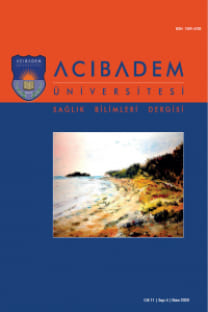Postpartum Dönemde Beslenme, Stres ve Uyku Durumunun Emzirme Tutumuna Etkisi
The Effects of Nutrition, Stress and Sleep Status on Breastfeeding Attitude in the Postpartum Period
___
- 1. Cangöl E, Şahin N. Factors Affecting Breastfeeding and Breastfeeding Counselling. Zeynep Kamil Tıp Bülteni. 2014;45:100-5. DOI:10.16948/ zktb.80388
- 2. World Health Organziation. Global strategy for infant and young child feeding. Access: http://apps.who.int/iris/bitstream/ handle/10665/42590/9241562218.pdf;jsessionid=A7B49E90F13929 F31CA70F520AB36526?sequence=1.
- 3. Davidson EL and Ollerton RL. Partner behaviours improving breastfeeding outcomes: An integrative review. Women and Birth. 2020;33:15–23. DOI: 10.1016/j.wombi.2019.05.010
- 4. Song JE, Kim T and Ahn JA. A Systematic Review of Psychosocial Interventions for Women with Postpartum Stress. J Obstet Gynecol Neonatal Nurs. 2015;44:183–92. DOI: 10.1111/1552-6909.12541
- 5. Navidian A, Sarasiyabi AS and Koochakzai M. The effect of homebased supportive-educational counseling on primigravidas’ postpartum stress. Int J Women’s Heal Reprod Sci. 2017;5:112–8. DOI: 10.15296/ijwhr.2017.21
- 6. Gallaher KGH, Slyepchenko A, Frey BN, et al. The Role of Circadian Rhythms in Postpartum Sleep and Mood. Sleep Med Clin. 2018;13:359–74. DOI: 10.1016/j.jsmc.2018.04.006
- 7. Okun ML, Mancuso RA, Hobel CJ, et al. Poor sleep quality increases symptoms of depression and anxiety in postpartum women. J Behav Med. 201841:703–10. DOI: 10.1007/s10865-018-9950-7
- 8. Meltzer-Brody S, Howard LM, Bergink V, et al. Postpartum psychiatric disorders. Nat Rev Dis Prim. 2018;4:1–18. DOI: 10.1038/nrdp.2018.22 9. Scharfe E. Maternal attachment representations and initiation and duration of breastfeeding. J Hum Lact. 2012;28:218–25. DOI: 10.1177/0890334411429111
- 10. Park ER, Psaros C, Traeger L, et al. Development of a Postpartum Stressor Measure. Matern Child Health J. 2015;19:2094–101. DOI: 10.1007/s10995-015-1731-0
- 11. Şahbaz G, Erbil N. Turkish Validity and Reliability of the Postpartum Stressors Scale (Master Thesis). Ordu University. 2019.
- 12. Yang CL, Yu CH, Chen CH. Development and validation of the postpartum sleep quality scale. J Nurs Res. 2013;21:148–54. DOI: 10.1097/jnr.0b013e3182921f80
- 13. Boz I, Selvi N. Testing the Psychometric Properties of the Postpartum Sleep Quality Scale in Turkish Women. J Nurse Res. 2018;26:385-92. DOI: 10.1097/jnr.0000000000000253
- 14. Özkan HA. Breastfeeding Attitude Evaluation Scale. KASHED 2015;2:53-8.
- 15. Yüzügüllü D, Aytaç N, Akbaba M. Psychopathological Situation and Affecting Factors in Breastfeeding Mothers. J Health Soc. 2018;28:32-40.
- 16. Pillay J and Davis TJ. Physiology, Lactation. StatPearls. StatPearls Publishing; 2018.
- 17. Akçay Didişen N, Uzşen H, Buldur E. Investigation of Mothers Attitudes During Breastfeeding Affecting Breastfeeding Behavior. Journal of Adnan Menderes University Health Sciences Faculty 2021;5:84-92 DOI: 10.46237/amusbfd.674579
- 18. Prashanthi S, Dorathydevakirubai T, Regi A. A Study to Assess the Perceived Stress and Coping Strategies of Postnatal Mothers. IOSRJNHS. 2020;9:15–26. DOI: 10.9790/1959-0903111526
- 19. Lyons S, Currie S, Peters S, et al. The association between psychological factors and breastfeeding behaviour in women with a body mass index (BMI) ≥30 : a systematic review. Obes Rev. 2018;19:947–59. DOI: 10.1111/obr.12681
- 20. Aksu A and Vefikulucay Yilmaz D. The relationship of postpartum sleep quality and breastfeeding self-efficacy of Turkish mothers. Scand J Caring Sci. 2019;33:833–9. DOI: 10.1111/scs.12679
- 21. Rognmo K, Sivertsen B and Eberhard-Gran M. Self-reported short sleep duration and insomnia symptoms as predictors of postpregnancy weight change: Results from a cohort study. Women’s Heal. 2016;12:465–74. DOI: 10.1177/1745505716668871
- 22. Kurnaz D. Factors affecting the attitudes and achievements of mothers in early postpartum period. Adnan Menderes University, Graduate School of Health Sciences, 2014, Master Thesis, Aydın.
- 23. Yiğitbaş Ç, Kahriman İ, Yeşilçiçek Çalık K, et al. About The Breast- Feedıng Attitudes And Behavıour Of The Mothers That Gave Bırt In Hospitals In Trabzon. GUJHS. 2012;1:49-59.
- 24. Chen C-N, Yu H-C and Chou A-K. Association between Maternal Prepregnancy Body Mass Index and Breastfeeding Duration in Taiwan: A Population-Based Cohort Study. Nutrients. 2020;7;12:2361-72. DOI: 10.3390/nu12082361
- 25. Wang X, Kishma EE, Sparks JR, et al. Sleep Disturbance But Not Sleep Duration Is Associated With Perceived Stress And Self-esteem In Postpartum Women. Sleep. 2020;27:A324. DOI: 10.1093/sleep/ zsaa056.847
- 26. Ko SH, Chen CH, Wang HH, et al. Postpartum women’s sleep quality and its predictors in Taiwan. J Nurs Scholarsh. 2014;46:74–81. DOI: 10.1111/jnu.12053
- 27. Jiang Q, Zhang E, Cohen N, et al. Postnatal Mental Health, Breastfeeding Beliefs, and Breastfeeding Practices in Rural China. 2021. DOI:10.21203/rs.3.rs-155309/v1
- 28. Duran S, Kaynak S and Karadaş A. The relationship between breastfeeding attitudes and perceived stress levels of Turkish mothers. Scand J Caring Sci. 2020;34:456–63. DOI: 10.1111/scs.12749
- 29. Gordon LK, Mason KA, Mepham E, et al. A mixed methods study of perinatal sleep and breastfeeding outcomes in women at risk for postpartum depression. Sleep Heal 2021;7:353-61. DOI: 10.1016/j. sleh.2021.01.004
- 30. Smith JP and Forrester RI. Association between breastfeeding and new mothers’ sleep: a unique Australian time use study. Int Breastfeed J. 2021;16:1-13. DOI: 10.1186/s13006-020-00347-z
- ISSN: 1309-470X
- Yayın Aralığı: Yılda 4 Sayı
- Başlangıç: 2010
- Yayıncı: ACIBADEM MEHMET ALİ AYDINLAR ÜNİVERSİTESİ
Osman Okan OLCAYSÜ, Buğra KARASU, Elif OLCAYSU, Atilla ÇAYIR, Ali Riza Cenk CELEBİ
Besleme Uygulamaları ve Yapısı Anketi Türkçe Geçerlik ve Güvenilirlik Çalışması
What Does YouTube® Say about Schizophrenia: Is It a Reliable Source of Information?
Aybeniz CİVAN KAHVE, Gonca AŞUT, Hasan KAYA, Yunus HACIMUSALAR
Yetişkin Bireylerde Covid-19 Tükenmişliğinin Hedonik Açlık ile İlişkisinin Değerlendirilmesi
Hülya KAMARLİ ALTUN, Nilgün SEREMET KÜRKLÜ, Merve Şeyda KARAÇİL ERMUMCU
Laparoskopik ve Açık Adrenalektominin Karşılaştırılması
Evren Durak, Emine Özlem Sayın Gür, Mehmet Hacıyanlı, Onur Dülgeroğlu, 0000-0003-1204-7546, Tayfun Bilgiç, Özgün Akgül, Fatma Tatar, Yusuf Kumkumoğlu
Figen ŞENGÜN İNAN, Neslihan GÜNÜŞEN, Murat KESER, İlhan ÖZTOP
Evaluation of the Quality and Reliability of Youtube Videos on Neurological Symptoms of COVID-19
Yetişkin Bireylerde Hedonik Açlık, Kronotip ve Anhedoni İlişkisi
